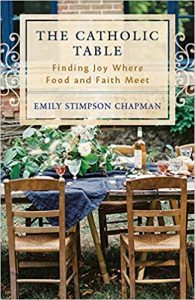The Catholic Table: Finding Joy Where Food and Faith Meet
by Emily Stimpson Chapman
 “Man’s story can’t be told apart from food; it’s inextricably woven into the fabric of life. God’s story can’t be told apart from food either; God the Son actually becomes food.” As human beings, food is always both a necessity and a gift. Yet throughout history, man has struggled with his eating habits.
“Man’s story can’t be told apart from food; it’s inextricably woven into the fabric of life. God’s story can’t be told apart from food either; God the Son actually becomes food.” As human beings, food is always both a necessity and a gift. Yet throughout history, man has struggled with his eating habits.
The Catholic Table begins with an assessment of modern man’s issues with eating. Many of us have experienced a complicated relationship with food at some time or another, whether battling an eating disorder, struggling with overeating, suffering from food allergies, or worrying about providing healthy food to our families. It’s with this tumult in mind – diet fads, “food porn”, meals eaten in isolation – that Emily Stimpson Chapman brings the light of faith to our most blessed necessity.
As Catholics, we need earthly food to nourish our bodies and heavenly food – Panis Vivus, the Bread of Life – to nourish our souls. For Stimpson Chapman, the key to truly appreciating food is a sacramental worldview, intuited by the Greeks who saw a Supreme Being through the order of creation and then brought to light in the Incarnation of the Son of God. Visible, natural things point beyond themselves to Someone greater. In fact, it was realizing this sacramental worldview that led her down the path of healing from her own eating disorder.
The author certainly gives us plenty to chew on, but the theology presented is digestible. Through an overview of John Paul II’s theology of the body, Stimpson-Chapman helps us see the goodness of our God-given bodies and how we reveal God in our very flesh. In the Holy Scriptures, we read of Adam and Eve’s fall after eating the forbidden fruit, the strict dietary laws of the Jewish people, the Last Supper in the Upper Room, and the wedding feast of the Lamb in Revelation. Two chapters are dedicated to two important food-related aspects of Catholic life: fasting and feasting. Through fasting (very different from dieting!) we “remember who we are: weak, frail, hungry men and women dependent upon God’s grace.” Through feasting liturgically, we anticipate the nuptial banquet that is to come in heaven. Particularly poignant is the chapter on hospitality, a call to couples, families, and singles alike to invite another into our homes in a gesture of love.
Food, as Stimpson Chapman points out, is more than just a way to energize our bodies. It’s a sign of our dependence on one another; nearly everything we eat is grown, slaughtered, or harvested. It can also be an occasion of virtue, whether we sacrifice energy and time to cook an important meal or exercise temperance in enjoying a decadent treat. And it brings a community together like nothing else on earth!
Chapters are peppered with quotes and anecdotes from holy men and women and handy lists of Catholic cookbooks, practical ways to fulfill Christ’s command to “feed the hungry,” easy party ideas, etc. There are also delicious recipes, such as Grandma’s pumpkin bread, roasted brussel sprouts, and pork tenderloin with bourbon sauce. The author includes nine of her own “kitchen rules” (“eat liturgically,” “eat virtuously,” “eat communally,” among others) and a lengthy bibliographic essay for further reading.
Stimpson Chapman writes like someone you could easily discuss faith, prayer, and the beauty of life with over coffee – or, rather, a delicious meal. Her writing is truly Catholic, always pointing back to Christ in the Eucharist. She presents a thought-provoking and enjoyable read. I often found myself pausing to self-reflect: do I eat with gratitude, with joy, with others? Do I take the time to pray before meals? Do I treat my body as an image and gift from God by the way I feed it?
This is not merely a book about dinner party planning. This is a book about being human, loving our bodies as temples of the Holy Spirit, and loving others through holy hospitality and humble service. The reader is invited to think – and perhaps pray – carefully about what he consumes, not just for nutritional content but for spiritual edification. Whether you’re a serious foodie, an aspiring chef, a busy parent, or anyone else who needs food to survive, this book is one to sip slowly like a good glass of wine, savored like a gourmet meal, and shared in the presence of others.
With a new awareness of the food that we need in order to survive, we can become healthier in body and soul. We can begin to live in a deeper, more human way and become holier through our fasts and our feasts.
About the Reviewer: Caty Long worked as an office assistant in the Secretariat of Laity, Marriage, Family Life, and Youth at the USCCB for nearly two years. She holds a Master’s in Theological Studies from the Pontifical John Paul II Institute for Studies on Marriage and Family.
Disclaimer: Book reviews do not imply and are not to be used as official endorsement by the USCCB of the work or those associated with the work. Book reviews are solely intended as a resource regarding publications that might be of interest to For Your Marriage visitors.




